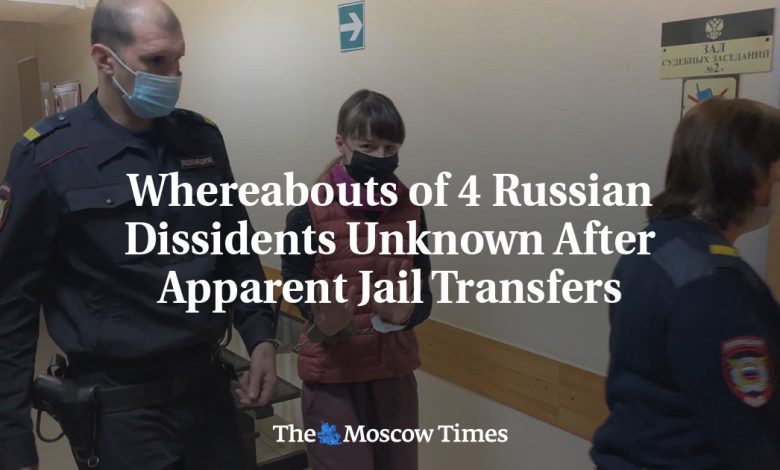Whereabouts of 4 Russian Dissidents Unknown After Apparent Jail Transfers

The whereabouts of four Russian political prisoners — Lilia Chanysheva, Ksenia Fadeyeva, Oleg Orlov and Alexandra Skochilenko — are unknown after their apparent transfer to new prison facilities, lawyers and relatives said on Monday.
Prison authorities in Russia often subject high-profile inmates to secret and lengthy transfers across the country. Shortly before his death at an Arctic penal colony in February, the whereabouts of late Kremlin critic Alexei Navalny were unknown for nearly three weeks while he was moved to that prison.
The husband of Navalny ally Chanysheva said on Monday that his wife had “left” the penal colony in the Perm region where she was being held last Friday and has not been heard from since. “She’s nowhere to be found,” he wrote on X (formerly Twitter).
Chanysheva was the first of Navalny’s associates to be arrested on “extremism” charges in 2021 and was sentenced to nine and a half years in prison earlier this year. In May, Russian state media claimed that she asked President Vladimir Putin for a pardon.
Meanwhile, Fadeyeva’s lawyers said prison authorities in the Novosibirsk region informed them that she had also “left” but declined to say when or why. Fadeyeva, another Navalny ally, is serving a nine-year “extremism” sentence.
Orlov, who serves as the co-chair of the human rights group Memorial, was also said to have “left” the prison where he was being held in the city of Syzran, according to his lawyer. The 71-year-old veteran activist was sentenced to two and a half years in prison this year for his opposition to the full-scale invasion of Ukraine.
So, too, was artist Skochilenko moved to “another facility,” according to a letter published by a group of supporters. She was sentenced last fall to seven years behind bars for replacing price tags at a St. Petersburg supermarket with anti-war messages.
Skochilenko’s supporters believe she was moved from St. Petersburg to a prison in Moscow.
It was not immediately clear whether the apparent prison transfers were connected.
A Message from The Moscow Times:
Dear readers,
We are facing unprecedented challenges. Russia’s Prosecutor General’s Office has designated The Moscow Times as an “undesirable” organization, criminalizing our work and putting our staff at risk of prosecution. This follows our earlier unjust labeling as a “foreign agent.”
These actions are direct attempts to silence independent journalism in Russia. The authorities claim our work “discredits the decisions of the Russian leadership.” We see things differently: we strive to provide accurate, unbiased reporting on Russia.
We, the journalists of The Moscow Times, refuse to be silenced. But to continue our work, we need your help.
Your support, no matter how small, makes a world of difference. If you can, please support us monthly starting from just $2. It’s quick to set up, and every contribution makes a significant impact.
By supporting The Moscow Times, you’re defending open, independent journalism in the face of repression. Thank you for standing with us.
Continue
Not ready to support today?
Remind me later.
×
Remind me next month
Thank you! Your reminder is set.





